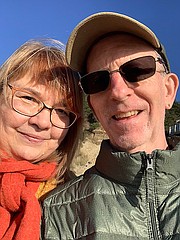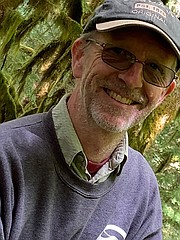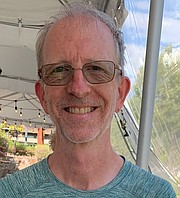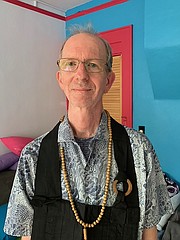Community pays tribute to visionary mayor
▶️ Listen to this article now.
David Sawyer, an innovator whose leadership brought an array of improvements to Sandpoint during his term as mayor, died April 7 in Salem, Oregon, of ALS, and Lyme disease. He was 64.
Sawyer first served on the city council four years and served as mayor of Sandpoint from 1996 to 2000. He made the position a full-time effort, though the pay represented only part-time work. He slept on his sailboat at Sandpoint Marina, often cross-country skied to work, played the piano with aplomb, and called himself a Buddhist. Sawyer held a B.A. in astrophysics from Wesleyan University. He was 37 when elected mayor.
His accomplishments were far-reaching. He worked with Nancy Gerth to bring internet to Sandpoint. “I worked with David in the Solutions Group and essentially brought the internet to Sandpoint by bringing Free Net to the schools,” said Gerth, “and he helped me with efforts to get computers into the schools. He also worked hard to make the bypass beautiful. He was a visionary, so intelligent.”
Interested in educational opportunities for Sandpoint-area residents, he worked with Stephen Drinkard to bring North Idaho College’s first satellite location, even helping with the hands-on remodeling of a space off Second Avenue.
Sawyer was proud of holding the line on taxes during his administration, yet in cooperation with the Assembly of God Church, managed to purchase the 7-acre property now known as Travers Park; it includes Centennial Field, a bike path, perimeter parking, and soccer fields.
“He did so much as mayor; he demonstrated his passion to help the city every single day, like when he improved North Boyer,” said Kim Woodruff, recently retired director of the Sandpoint Parks and Recreation Department. “The fondest memory I have was when he was living on his Ranger sailboat during his term as mayor and I’m not sure if he ever learned to sail it!”
Sawyer believed in open government, exemplified by the creation of a home page to provide information about the city to citizens.
One of the founders of the Bonner County Human Rights Task Force, Sawyer was active in the community as part of the school district’s school-to-work program, and he worked on acquiring public transportation in Region 1.
Sawyer served on the advisory board of the Bonner Business Center, which opened in 1992 to assist Sandpoint residents with a place to develop products and services without the overhead costs usually associated with such a venture.
“I think David’s basic philosophy was that local governments like city governments can and should try to do things to make life better for its citizens,” said Chris Bessler, who owns Keokee Publishing. “And he tried to act on that. He really epitomized public service himself. He treated the mayorship like a full-time job, even though I think it paid $800 a month at the time, not exactly a living wage.”
Sawyer paid tribute to Helen Newton, longtime city clerk, in a Daily Bee article from January 2000. He said he could not have succeeded in office without her help.
“David first appeared in my office shortly after he moved here, introduced himself and asked if there was any way he could access the Community Hall occasionally to play the piano," Newton recalled of her first meeting with Sawyer. "It was only the first of many unorthodox situations I experienced with David, and for some reason I trusted him, and we arranged for that to happen. One day in the summer of 1991 he came in and said, ‘I’m thinking about running for city council. What do I have to do to win?’ I told him he would need to knock on every door in town. I said people want to put a name together with a face and you are virtually unknown here. He said, ‘Great. I can do that. Let’s see the paperwork.’
“He did the work and he won. Dwight Sheffler was elected mayor. Ray Miller was already on the city council and let’s just say the three of them weren’t necessarily adversaries but they seldom saw issues in the same way. Their distinct personalities made for some very entertaining council meetings,” said Newton.
By hiring a project coordinator/grant writer, Sandpoint was able to buy land surrounding the Sand Creek watershed and to beautify Fifth Avenue with trees. During Sawyer’s tenure, Sandpoint acquired a RV pump-out station at the fairgrounds.
Even though he changed his position on the bypass, he had a sense of humor about it. In the Jan. 19, 2000, edition of the Bonner County Daily Bee, he wrote, “So bury me under the pillars with trumpets and fanfare and make my funeral pyre high and hot. If blame and mockery needs to be laid, lay it on thick and rummy, with weeping and wailing and then … finally … for once and for all … BE DONE WITH IT!" Sawyer thought the bypass was the safest way to go for Sandpoint and he worked to acquire it, said Manuela Terlinden, Sawyer’s wife.
“David had a large and positive impact on Sandpoint,” said Ross Fulmer of Sandpoint. “He created the position of grant writer, Stephen Drinkard, who was a fount of ideas, and they worked together to bring downtown revitalization, public art, (and later) the historic boardwalk. David had a vision for Sandpoint,” Fulmer said.
Former mayor Carrie Logan (2014-2015) said Sawyer appointed her to the Planning and Zoning Commission in 1996. “He facilitated workshops between the P & Z and the city council to create communication between the two entities. He was not confrontational, he had a good sense of humor, and he cared about Sandpoint,” Logan said.
Sawyer then worked as the Turner, Oregon, city administrator for 16 years. “He helped navigate Turner to a vibrant growing community,” wrote Linda Hansen, city clerk of Turner. “The list of projects achieved during his tenure is long, varied and showed his vision for the future. Refinancing the sewer system debt had the biggest impact on Turner’s future and fueled the variety of infrastructure and amenity enhancements Turner saw in the past eight years.”
As city administrator he was able to acquire the land for that city’s park and then another park, named David Sawyer Park, is a lovely park by a stream with trees, play equipment, restrooms and a baseball field, his wife said.
“David was able to bring people to the table together, to initiate coalitions,” Terlinden said.
Newton agreed.
“David’s favorite word was ‘dialogue.’ I think every member of the staff would attest to that as a fact. Every subject deserved a dialogue. He liked to use exercises, physical and conversation, to bring the staff, sometimes including the city council, together to explore ideas and new approaches to government. He was intelligent, articulate, caring about family, friends, and community. I seldom characterize anything or anyone as unique, but I have to say that I think David Sawyer qualified,” Newton said.
Sawyer’s wife is a doctor of Chinese medicine; she cared for David during his 2.5 years of illness. “I believe his soul was tired. When I walk into the bedroom where he passed, there is peace, a stillness,” she said.
“It was my honor and pleasure to serve as city clerk during his tenure and to remain friends with him ever after. He is gone too soon, and I know he was reluctant to leave so many dreams, plans, and projects left undone. But I am glad he found himself living in Oregon where he could die in dignity at home with Manuela and Sophie (David and Manuela’s 17-year-old daughter) by his side,” Newton said.
Sawyer will be honored at a memorial service in mid-May at a Christian retreat center near Turner, his wife said. Part of his ashes will be spread in Lake Pend Oreille in the summer. “He loved that lake and part of him will go back there,” his wife said.









